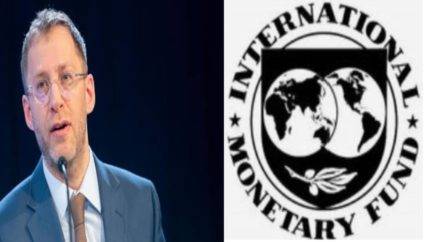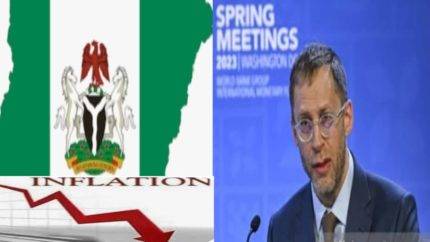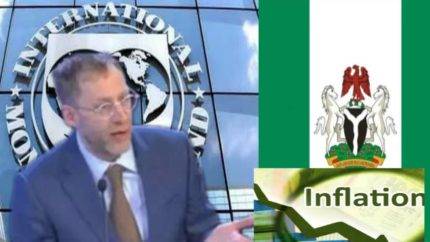International Monetary Fund’s (IMF’s) optimistic projections for Nigeria’s inflation rate, anticipating a significant drop from 28.92% to 23% in 2024 and a further decrease to 15.5% in 2025. Daniel Leigh’s insights, crucial for policymakers and investors navigating Nigeria’s economic trajectory. Stakeholders, gear up for potential relief and a positive economic turnaround.
Daniel Leigh, International Monetary Fund’s research department chief, shares a comprehensive analysis of Nigeria’s economic landscape during the WEO update press conference. Uncover pivotal elements and gain a deep understanding of global economic dynamics, fiscal policies, and external factors shaping Nigeria’s future. Equip yourself with insights for informed decision-making in the evolving economic scenario!
Nigeria’s Economic Resurgence: A Glimpse into IMF’s Projections and December 2023 Recap
In December 2023, Nigeria faced a daunting 28.92% inflation rate, triggering concerns across sectors. The IInternational Monetary Fund’s optimistic projection signals hope for a turnaround. Dive into the implications of this anticipated decline, offering a potential shift towards economic stability and recovery. Stakeholders, stay informed and optimistic about Nigeria’s economic future.
The International Monetary Fund’s projections hold immense potential for Nigeria’s economic stability, promising enhanced purchasing power and relief for businesses. However, challenges and uncertainties loom. Policymakers, stay vigilant! Navigate global economic shifts with adaptive fiscal strategies and targeted measures for sustained economic recovery.
IMF’s Roadmap for Stability: Addressing Root Causes of Inflation in Nigeria
International Monetary Fund’s advocates a holistic strategy for Nigeria’s economic resilience, emphasizing structural reforms, prudent fiscal policies, and sector-specific interventions. Collaborative efforts among government, central bank, and stakeholders are pivotal. Nigeria aims not just for immediate alleviation but to build a robust foundation for enduring economic stability. Follow the roadmap to economic resilience.
As voices echo across Nigeria, from government officials to economists and business leaders, the nation stands at a critical juncture. The responses of these key stakeholders will shape effective policy decisions and strategic maneuvers. Witness the unfolding months as a litmus test for the accuracy of International Monetary Fund’s projections, steering Nigeria towards a secure and robust economic future.

International Monetary Fund’s Predicts Significant Decline in Nigeria’s Inflation Rate
According to International Monetary Fund’s latest World Economic Outlook (WEO) update, revealing optimistic projections for Nigeria’s inflation rate in the coming years. Daniel Leigh, the division chief of the International Monetary Fund’s research department, predicts a significant decline, foreseeing a drop from the current 28.92 percent to 23 percent in 2024 and a further decrease to 15.5 percent in 2025. This forecast provides a ray of hope for Nigeria, grappling with a prolonged surge in inflation over the past 11 months, making it a pivotal development for economic stability.
Delve into the insights shared by Daniel Leigh, shedding light on the critical implications of these projections for Nigeria’s economic landscape. With inflation being a pressing concern, the IMF’s optimistic outlook offers potential relief and signals a positive trajectory. Stakeholders, policymakers, and investors are likely to closely monitor these projections, as a successful reduction in inflation could pave the way for enhanced economic recovery and increased investor confidence in Nigeria.
International Monetary Fund’s Insightful Analysis Unveiled at WEO Update Press Conference
In the recent WEO update press conference, Daniel Leigh, spearheading the IMF’s research department, shed light on the anticipated decrease in Nigeria’s inflation rate. Through meticulous analysis, Leigh’s team identified pivotal elements influencing the economic landscape. Emphasizing the interconnected nature of global economic dynamics, fiscal policies, and external factors, Leigh provided a comprehensive understanding of the intricate web shaping Nigeria’s economic trajectory. This insightful analysis, presented during the conference, not only anticipates challenges but also serves as a crucial guide for policymakers and stakeholders. The IMF’s aim is to equip them with the knowledge needed to navigate the evolving economic scenario, fostering stability through well-informed decisions.
Daniel Leigh’s thorough examination during the WEO update delves into the multifaceted aspects of Nigeria’s economic landscape. By pinpointing key drivers and potential mitigating factors, Leigh’s leadership ensures a nuanced understanding of the country’s economic trajectory. The International Monetary Fund’s commitment to providing comprehensive insights extends beyond mere predictions; it strives to empower decision-makers with the tools to navigate uncertainties. This approach is designed to foster stability by enabling informed decisions rooted in a deep comprehension of the economic dynamics at play. As Nigeria’s policymakers and stakeholders grapple with the challenges ahead, the International Monetary Fund’s analysis stands as a beacon, guiding them toward strategies that promote economic resilience and sustainability.
Current Inflation Scenario in Nigeria, A Recap of December 2023
In December 2023, Nigeria grappled with a formidable economic scenario, grappling with a soaring inflation rate at an alarming 28.92 percent. This concerning statistic highlighted an 11-month streak of persistent inflation, leaving a profound impact on diverse economic sectors. Policymakers, businesses, and the public expressed growing apprehension about the ramifications of this prolonged inflationary pressure. Amidst these challenges, the International Monetary Fund (IMF) emerged as a beacon of optimism, forecasting a forthcoming reduction in inflation. This prediction sparks hope for the Nigerian economy, hinting at a potential turnaround from the disconcerting trend witnessed in recent months.

As Nigeria confronted this economic turmoil, the gravity of the situation permeated various facets of society. The sustained rise in inflation prompted a collective unease, prompting stakeholders to closely monitor the unfolding developments. Against this backdrop, the International Monetary Fund’s anticipatory projection serves as a crucial point of reference, injecting a sense of optimism into the discourse surrounding Nigeria’s economic trajectory. If realized, the forecasted decline in inflation could signify a pivotal moment, steering the nation away from the challenges posed by the prolonged inflationary streak towards a path of economic stability and recovery.
Economic Implications for Nigeria: Navigating Uncertainties
In the realm of economic outlook, Nigeria’s future hinges on the International Monetary Fund’s projections. The potential impact of a reduced inflation rate is immense, rippling through the fabric of the nation’s economy. This anticipated decline not only promises enhanced consumer purchasing power but also presents a lifeline to businesses grappling with escalating costs. Such a shift is poised to fortify overall economic stability, offering a beacon of hope for Nigeria’s financial landscape.
Yet, within this optimistic projection lies a landscape of challenges and uncertainties. Navigating these hurdles demands a vigilant stance from Nigerian authorities. Policymakers must be agile, closely monitoring global economic shifts. An adaptive fiscal strategy and the implementation of precisely targeted measures become paramount. Only through such meticulous oversight and proactive measures can Nigeria translate the projected inflation decline into a catalyst for sustainable economic recovery, securing a prosperous future.
Addressing Root Causes, International Monetary Fund’s Recommendations for Sustainable Stability
In response to the International Monetary Fund’s illuminating insights, Nigeria stands at a crucial juncture where tackling the foundational drivers of inflation emerges as a linchpin for bolstering economic resilience. The International Monetary Fund advocates for a holistic strategy, encompassing pivotal elements such as structural reforms, judicious fiscal policies, and targeted interventions in key sectors. To optimize the impact of these measures, seamless collaboration among the government, central bank, and pertinent stakeholders is imperative, fostering a united front to execute and sustain the IMF’s recommendations. This concerted effort is pivotal not only for immediate alleviation but also for laying the groundwork that paves the way toward enduring economic stability in the long term.
Delving into the multifaceted facets of the IMF’s recommendations, Nigeria’s focus on addressing the root causes of inflation is positioned as a proactive strategy. By undertaking comprehensive structural reforms, implementing prudent fiscal policies, and strategically intervening in crucial sectors, the nation aims to create a robust framework that fortifies its economic foundations. The synergy among governmental entities, the central bank, and other stakeholders is the linchpin to translating these prescriptions into impactful actions. Through this collaborative approach, Nigeria aspires not only to navigate the challenges of the present but also to forge a trajectory toward sustained economic stability, aligning itself with the IMF’s counsel for a resilient and flourishing economic future.
Stakeholder Responses and Future Outlook
In the wake of the IMF’s latest inflation predictions, a spectrum of voices has resonated across Nigeria, involving government officials, economists, and business leaders. This diverse range of perspectives signifies the significance of the issue at hand and its potential impact on the nation’s economic trajectory. As Nigeria endeavors to chart a course toward recovery, the nuanced responses from these key stakeholders become pivotal elements in the formulation of effective policy decisions and strategic maneuvers. Their collective insights will undoubtedly influence the economic landscape, steering Nigeria toward stability and resilience.
The unfolding months stand as a critical juncture, wherein the realization or deviation from the projected decline in inflation will sculpt the foundation for a more secure and robust Nigerian economy in the foreseeable future.
In this dynamic context, the months ahead assume a pronounced importance, serving as a litmus test for the accuracy of the International Monetary Fund’s inflation projections. The responsiveness and adaptability of policymakers, guided by the insights gleaned from various quarters, will determine the efficacy of the measures taken to mitigate inflationary pressures. This period not only holds the potential to validate economic forecasts but also to set the tone for a more resilient and prosperous Nigerian economy in the long term. The convergence of perspectives from government, economic experts, and business leaders during this critical phase forms the mosaic that will shape Nigeria’s economic landscape and contribute to its journey of recovery and growth.
Table of Contents
Discover more from OGM News NG
Subscribe to get the latest posts sent to your email.














